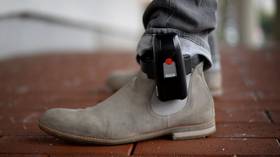Ankle monitors, house arrest, & armed guards: Covid-19 enforcement measures ramp up even as lockdowns wind down

A Kentucky couple have become the latest victims of heavy-handed pandemic enforcement, being outfitted with ankle monitors after refusing to sign a self-quarantine order on testing positive for Covid-19. They’re far from alone.
Elizabeth and Isaiah Linscott were fitted with ankle monitors by Hardin County health authorities last week, as governments take a more intrusive approach to controlling the coronavirus pandemic. The couple had refused to sign an “isolation order,” insisting their problem was not with the idea of self-quarantine but with the way the order was phrased.
Also on rt.com Masks are Covid-19 ‘new normal’ and those refusing them should be SHAMED like drunk drivers, says Royal Society chiefThe pair were shackled with the monitors less than a week after refusing to sign a pledge to seek approval from the Department of Public Health before traveling by “any public, commercial or health care conveyance such as ambulance, bus, taxi, airplane, train or boat,” Elizabeth Linscott told local media on Sunday. While the isolation order also mandates daily check-ins and self-isolation, Linscott said the line about securing health department approval before leaving the home - even in an ambulance - was the reason they declined the order.
“My part was that if I have to go to the ER, if I have to go to the hospital, I’m not going to wait to get the approval to go,” she told local NBC affiliate WAVE.
Linscott tested positive for coronavirus on July 11, having taken the test as a prerequisite for visiting her parents in Michigan as she did not have any symptoms of the virus. When she refused to sign the form, she was told her case would be “escalated.” Days later, without further warning, over half a dozen people from different law enforcement and health agencies came to the couple’s door brandishing three court orders - one for their daughter - to submit to monitoring.
While the Linscotts are the first reported recipients of an ankle monitor in Hardin County, the city of Louisville has threatened quarantine-breakers with house arrest for months and had already ordered a handful of violators under house arrest for failing to self-quarantine. The couple plans to take Hardin County to court and lamented to local media that they felt like criminals. “We didn’t rob a store. We didn’t steal something. We didn’t hit and run. We didn’t do anything wrong,” Elizabeth said.
Also on rt.com South America’s Covid-19 crisis has exposed the inequalities of the region & the lack of real progress addressing povertySterner approaches to enforcing coronavirus restrictions are being felt across the US - and all around the world. Public health officials in Rockland County, New York slapped subpoenas on a group of young partygoers after they refused to cooperate with contact tracing efforts. The host of the party, who had gone ahead with the bash despite having Covid-19 symptoms, allegedly infected at least eight guests, but when a few refused to share information about who else they had interacted with, the subpoenas arrived, accompanied with the threat of a $2,000 fine for every day they refused to comply. According to Rockland County Executive Ed Day, that threat worked.
Such tactics are by no means limited to the US. Melbourne, Australia deployed hundreds of police officers inside nine public housing towers without so much as warning the inhabitants, in a “hard lockdown” to keep residents inside their apartments earlier this month. Even those who’d tested negative were prohibited from stepping outside, with police assigned to deliver food and other needs for them. The measure was adopted after a few dozen people in the towers tested positive for the virus.
His building has been locked down for 1 weekHe tested negative and all he wants is his right to stand outside and breath some fresh air.This is starting to remind me of the Handmaids tale.Its not bout rescuing children, wake up people.#melbournelockdown@riseupmelbournepic.twitter.com/dqFOyQ4oS0
— True_Lies_1984 🇭🇲🇮🇹 (@Biondz1) July 13, 2020
The “hard lockdown” was criticized as transparent economic discrimination, given that the inhabitants of hotspots of similar intensity in the suburbs received advance notice of their own “lockdowns” and were permitted to leave their homes for necessities. Some inhabitants of the housing towers claimed they received expired food or no food at all.
While the last Melbourne tower came out of total lockdown over the weekend, over 100 people living there remain confined, either because they tested positive for coronavirus or have had contact with someone who did.
Attempts to use security forces as lockdown enforcers initially failed in Australia, where “quarantine hotels” for returning citizens in Victoria, patrolled by private security, soon became pandemic hotspots due to mismanagement.
If you like this story, share it with a friend!













